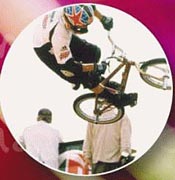| |
|||
|
home >> educational
resources >> getting
started >> publications >> poster
Explore Your Community: A Community Heritage Poster for the ClassroomChoose a Topic, any Topic -- Chances are It Has Links To Folklife or Cultural HeritageExplore Your Community Poster Panel FiveFollow an interest of yours or something you are curious about—skateboarding, gardening, your school's track team, pets, biking, fishing, cars, getting old or being young, e-mail hoaxes, hair styles, pizza. People like to talk about themselves and their life experiences. They enjoy telling stories about people they have known and activities, adventures, and experiences they have had. Pick a topic and explore its connections with folklife and cultural heritage in your community. What You Can Do The Good Old Days: Research and write about an event in the history of your community or some special quality of your neighborhood, something that it is known for. Interview parents, neighbors, and seniors. Check old newspapers, memoirs, and historic records, maps, and photographs. Create a time-line using what you have gathered to show how the community has changed since the "Good Old Days." Were the "old days" really so "good"? Prepare an exhibit in your school or local library or develop a multi-media presentation or Web site using materials you have gathered. The Immigrant Experience: From the beginning, our nation has been a meeting ground for different cultures. Today, American culture is made up of many cultural groups. Stories of immigration, or migrant experiences, contribute to a sense of belonging for a group. Collect family stories about moving to a new home or interview a recent immigrant in your community and learn about his or her culture and experiences. Read about historic events at the time of migration and write a history of this culture and its role in your community. Describe and document a local ethnic community festival or celebration using still and video photography and audio recording. Publish a Cookbook: Folklorists call the cooking traditions of a group or family "foodways." Collect traditional recipes from people in your community or from your family, perhaps focusing on one kind of food or the food of a specific cultural group. Interview people about how they learned recipes and the role that these traditional foods play in their lives and heritage. Study the production of a food or crop that is special to your community or celebrated at a local festival. Publish a cookbook, using quotes from people you have interviewed, historical details about the importance of the dishes, and photographs and sketches. |
| |||

